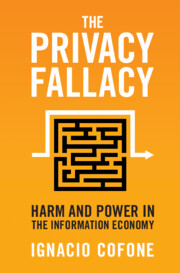Book contents
- The Privacy Fallacy
- The Privacy Fallacy
- Copyright page
- Dedication
- Contents
- Acknowledgments
- Abbreviations
- Introduction
- 1 The Traditionalist Approach to Privacy
- 2 Privacy Myths
- 3 The Consent Illusion
- 4 Manipulation by Design
- 5 Traditionalist Data Protection Rules
- 6 Pervasive Data Harms
- 7 Privacy as Corporate Accountability
- Conclusion
- Notes
- Index
3 - The Consent Illusion
Published online by Cambridge University Press: 16 November 2023
- The Privacy Fallacy
- The Privacy Fallacy
- Copyright page
- Dedication
- Contents
- Acknowledgments
- Abbreviations
- Introduction
- 1 The Traditionalist Approach to Privacy
- 2 Privacy Myths
- 3 The Consent Illusion
- 4 Manipulation by Design
- 5 Traditionalist Data Protection Rules
- 6 Pervasive Data Harms
- 7 Privacy as Corporate Accountability
- Conclusion
- Notes
- Index
Summary
Chapter 3 shows why the contracts model doesn’t work: consent is absent in the information economy. Privacy harm can’t be seen as a risk that people accept in exchange for a service. Inferences, relational data, and de-identified data aren’t captured by consent provisions. Consent is unattainable in the information economy more broadly because the dynamic between corporations and users is plagued with uneven knowledge, inequality, and a lack of choices. Data harms are collective and unknowable, making individual choices to reduce them impossible. Worse, privacy has a moral hazard problem: corporations have incentives to behave against our best interests, creating profitable harms after obtaining agreements. Privacy’s moral hazard leads to informational exploitation. One manifestation of valid consent in the information economy are consent refusals. We can consider them by thinking of people’s data as part of them, as their bodies are.
Keywords
Information
- Type
- Chapter
- Information
- The Privacy FallacyHarm and Power in the Information Economy, pp. 46 - 66Publisher: Cambridge University PressPrint publication year: 2023
